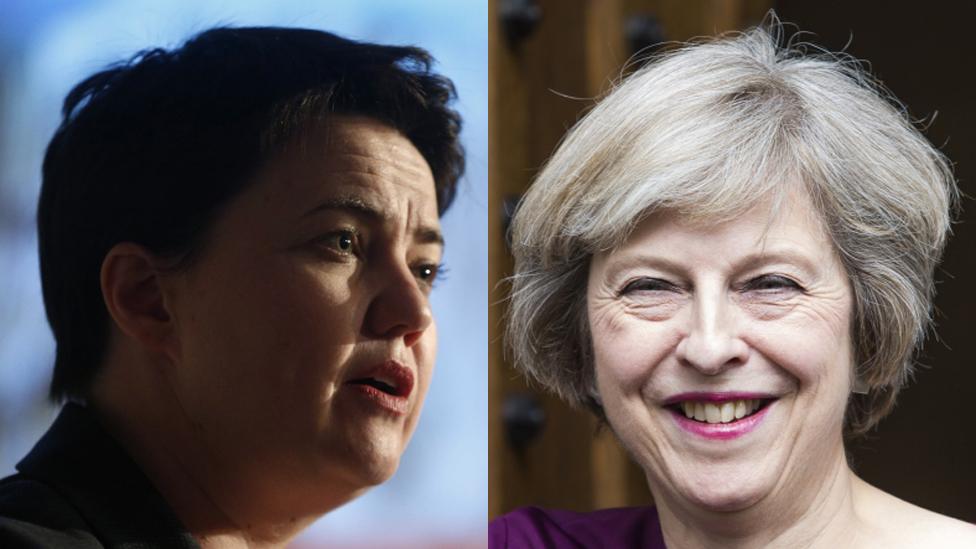Tory leadership: How will the next prime minister approach Scotland?
- Published
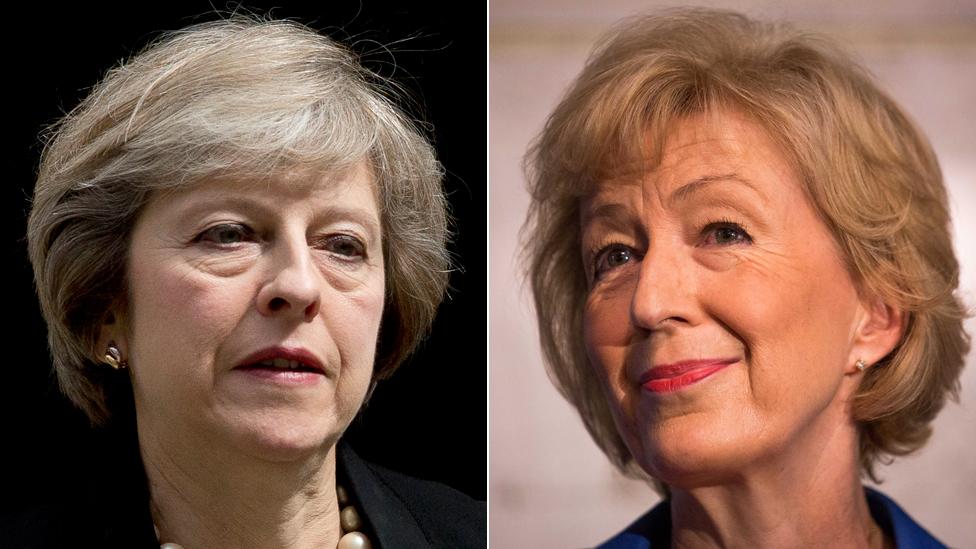
Either Theresa May (left) or Andrea Leadom (right) will be the next prime minister
Either Theresa May or Andrea Leadsom will be the next prime minister, after making it to the run-off vote in the Conservative leadership election. Here, I looked back through their records to see what the next occupant of 10 Downing Street's relationship with Scotland might be like.

In fairness, they have had other things on their minds. But Scotland appears to have been some way from the thoughts of Theresa May and Andrea Leadsom in recent times.
Questioned by Dundee MP Chris Law last month, Mrs May revealed that she had visited Scotland once, external "in an official capacity" since the 2015 election.
Mrs Leadsom meanwhile declared that she had "been to Scotland a number of times", but said she would have to write to Aberdeen MP Callum McCaig over the same question because "I do not know the answer, external".
But this has not always been the case - each woman has made a number of contributions about Scotland and its politics in the House of Commons and beyond, which offer some insight into what their approach to matters north of the border might be.

Theresa May
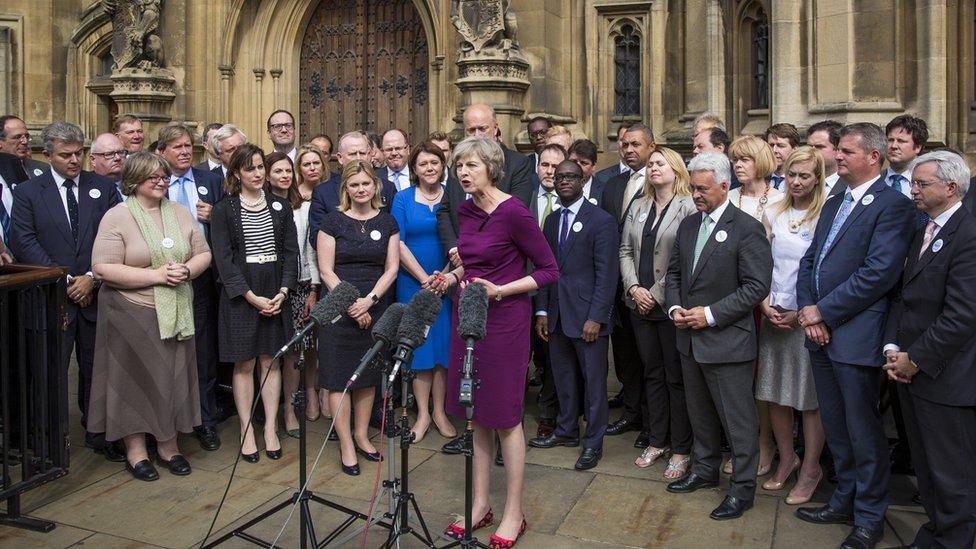
Theresa May has won the backing of many Conservative politicians - including Ruth Davidson and David Mundell
Home Secretary Theresa May has emerged as an early front-runner in the leadership race, winning the backing of 199 Tory MPs - including Scottish Secretary David Mundell - and the endorsement of Scottish Tory leader Ruth Davidson.
She was on the same side as the bulk of Scotland's voters and politicians in the EU referendum, although she has accused the SNP of "trying to face in two directions at the same time" over the issue.
During a Commons clash with Alex Salmond in May, she said "the SNP view appears to be to want to be in the EU, but it would actually like an exit vote so it can have another independence vote in Scotland".
The 59-year-old has pitched herself as a candidate who can "unite our country".
As home secretary she was an active player in the 2014 referendum, with Ms Davidson saying Mrs May would be "there in a heartbeat" whenever she called on her to come to Scotland to make speeches or raise funds.
An example would be when she said she would enforce passport checks at the border between Scotland and England should Yes win the referendum - something she may now have to contemplate implementing between Northern Ireland and the Republic of Ireland after the Brexit vote.
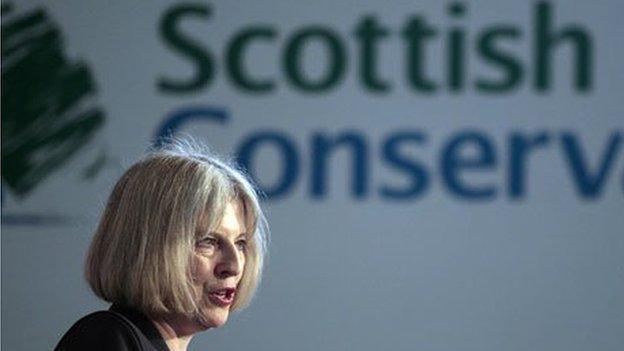
Ms May campaigned for a No vote during the 2014 independence referendum
Going further back, some of Mrs May's earliest contributions in the Commons chamber were during a debate on the embryonic Scottish Parliament in July 1997.
She questioned Donald Dewar on whether Holyrood would "simply be like a parish council" if it did not have full tax-varying powers, and later that year described the fact that English students would pay more to attend Scottish universities than those from EU member states as "discrimination" and "a fiasco".
More recently, she has come under fire from Scottish politicians repeatedly for her work as home secretary, particularly over immigration.
However with parts of her portfolio devolved to Holyrood along with areas of overlapping responsibility, she has pledged on several occasions to work closely with Scottish government officials and ministers on legislation and policy, citing "significant interaction" over issues such as migration and refugee placement.

Andrea Leadsom
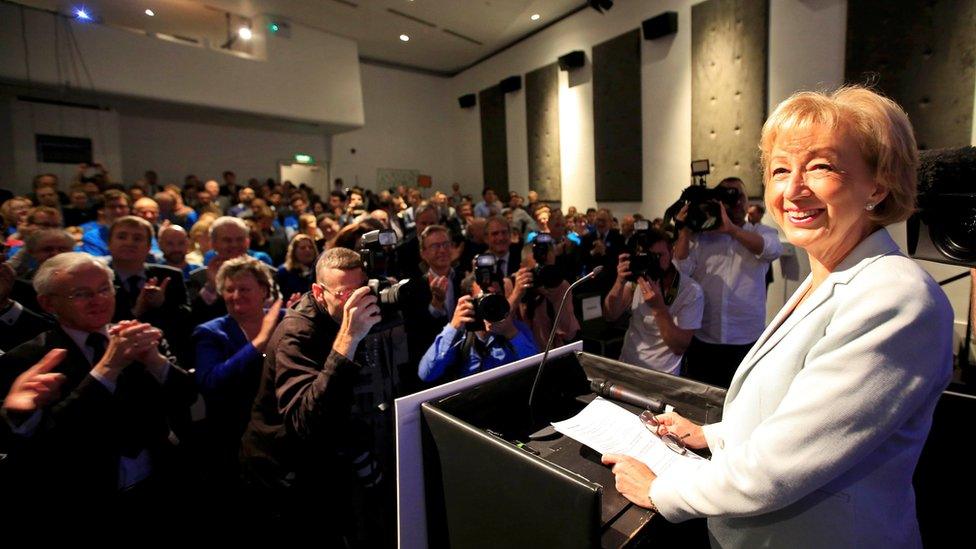
Andrea Leadsom came to prominence during the EU referendum campaign
Andrea Leadsom saw off the challenge of three men born north of the border - Michael Gove, Stephen Crabb and Liam Fox - to join Mrs May in the leadership run-off.
An avowed Brexiteer (in recent times at least), she will have a greater claim than her Remain-backing opponent to the sympathies of the million Scots who voted Leave on 23 June.
However, she might get less of a friendly ear from the bulk of the Scottish electorate - or indeed any of Holyrood's party leaders.
Having only been in parliament since 2010 and a minister since 2015, you could perhaps forgive the MP for South Northamptonshire for not having a huge level of engagement with Scotland to date.
But the 53-year-old does have some recent experience of Scottish politics, having gone toe-to-toe with some of Holyrood's top politicians as part of the EU referendum debates in which she became a household name.
She went up against Ms Davidson and Nicola Sturgeon in TV contests during the campaign, including one clash where she wrote off the first minister as "not a democrat" for wanting to take Scotland out of the UK.
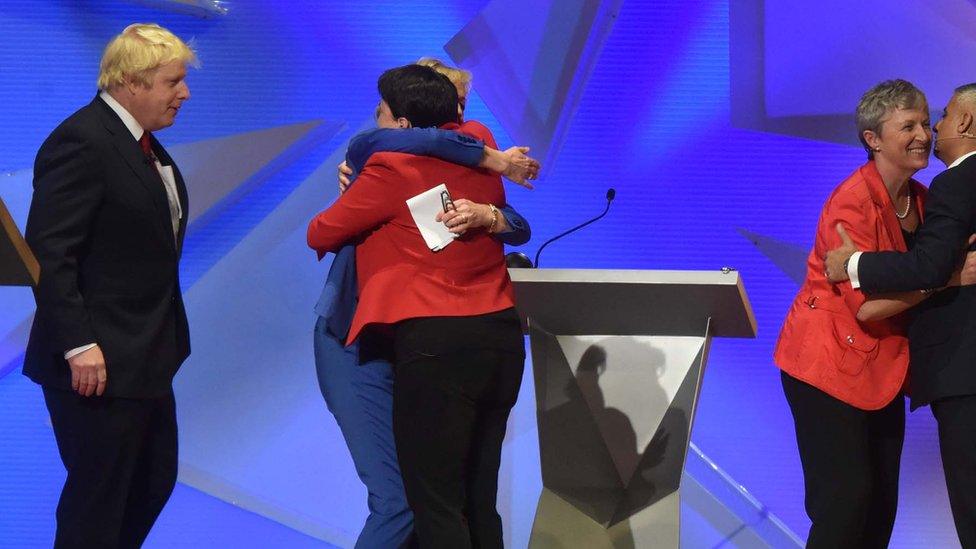
Ms Leadsom got a hug from Ruth Davidson after a TV debate - but didn't win her support in the leadership race
Ms Leadsom has since reinforced this position as part of her leadership drive, saying that she would "do everything in my power to keep the United Kingdom united".
She played a limited role at most in the 2014 referendum, although she did question then-Scottish Secretary Michael Moore in 2012 on whether an independent Scotland would have to use the euro.
However, she has declared herself "a big fan of devolution, external", both to Holyrood and to local government, and has called the Scottish Parliament "one of the strongest anywhere in the world".
That said, she has voted with her party against devolving additional powers to Holyrood on a number of occasions.
And she described the difference in tuition fees as "another nail in the coffin of the union, external", in the same blog where she describes the "unbelievable perks, external" of being part of the Union.
She has also praised the Scottish government's early-years policies, saying "enormous strides" had been made in supporting "the best possible start in life for every child", saying: "I commend that parliament for its foresightedness - I sincerely believe that other parts of the UK have something to learn from its actions."
In her role as energy minister, Ms Leadsom has described herself as "absolutely committed" to "the success of not only wind and the renewables sector in Scotland, but, importantly, the oil and gas sector".
But in one contrast with the Scottish government's approach, she has spoken of fracking for shale gas as "a fantastic opportunity, external" which "will create a significant number of local jobs".
Ms Sturgeon's government has imposed a moratorium on fracking while seeking scientific evidence, and Holyrood recently voted in favour of banning the extraction technique outright (although SNP MSPs abstained from the vote).
- Published8 July 2016

- Published8 July 2016
